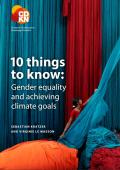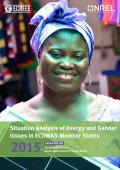
Although climate change and poverty are increasingly recognised as interlinked global problems, responses often focus on their scientific and economic dimensions only. This research study highlights the advantages and challenges of pursuing climate compatible development, i.e. inclusive green growth, from a gender perspective, pulling in evidence from projects in Asia, Africa and Latin America. The field work focused particularly on urban environments, as there is a relative paucity of data from cities, compared to rural areas.
While international frameworks are gradually becoming more aware of gender issues, all too often gender is simply “added” to existing policies. Women’s views, needs and participation are frequently excluded from climate change responses and development initiatives. Moreover women are often perceived as victims with little consideration for the contribution and leadership they could provide in adaptation and mitigation efforts.
A comparative study of gender approaches in climate compatible development initiatives in Peru, Kenya and India asked:

This report contains a fairly comprehensive analysis of the current situation of energy and gender issues in ECOWAS Member States. It outlines the fact that women continue to be excluded from the decision-making process concerning energy policy and also that their human rights continue to be compromised.
The aim of this report is to inform the development of the ECOWAS Policy for Gender Mainstreaming in Energy, which will support national governments in focusing and harmonizing their current efforts at gender mainstreaming, learning from one another, and collectively mobilizing support to achieve the SDGs and the objectives of the Sustainable Energy for All initiative.
The global failure to develop in a sustainable manner has led to attempts to adopt green economy approaches in the context of poverty alleviation and sustainable development. Given South Africa’s high carbon footprint and other negative environmental externalities, the government, in partnership with civil society and the private sector, is taking steps to green its economy. The efforts range from large-scale solar installation projects to small-scale grassroots level projects where green jobs are created for the poor, predominantly women, by paying them for environmental services. This paper addresses if and how green economy can be used to alleviate poverty and protect the environment at a grassroots level. In a project under the management of a local environmental non-governmental organisation (ENGO), poor urban women in Pietermaritzburg, South Africa, are utilising the concept to generate income, improve their livelihoods and contribute to environmental sustainability.
For the International Labour Organization (ILO), gender equality has been the core value of its work since its founding in 1919. The pursuit for gender equality is grounded on its recognition that equality is not just an intrinsic value and a right in itself, but also instrumental in achieving economic growth and poverty reduction. This policy brief aims to contribute to the discussion on how gender equality can become an integral part of green economy strategies and how equal access for women and men to green jobs which are decent can be enhanced. The policy brief is targeted at policy makers, social partners and experts in the field working on green jobs/green economy issues.
This tool kit assists staff and consultants of the Asian Development Bank (ADB) in conceptualizing and designing gender-responsive projects in the energy sector. It guides users in key questions to be asked and data to be collected during project preparation. It also offers a menu of entry points in designing project outputs, activities, inputs, indicators, and targets that integrate key gender issues identified during the gender analysis. The tool kit is broken down into key subsectors of ADB's energy sector investments - transmission and distribution, rural electrification, energy efficiency, and renewable energy. Case studies from ADB energy projects have been included to illustrate good practices in mainstreaming gender in energy sector.
